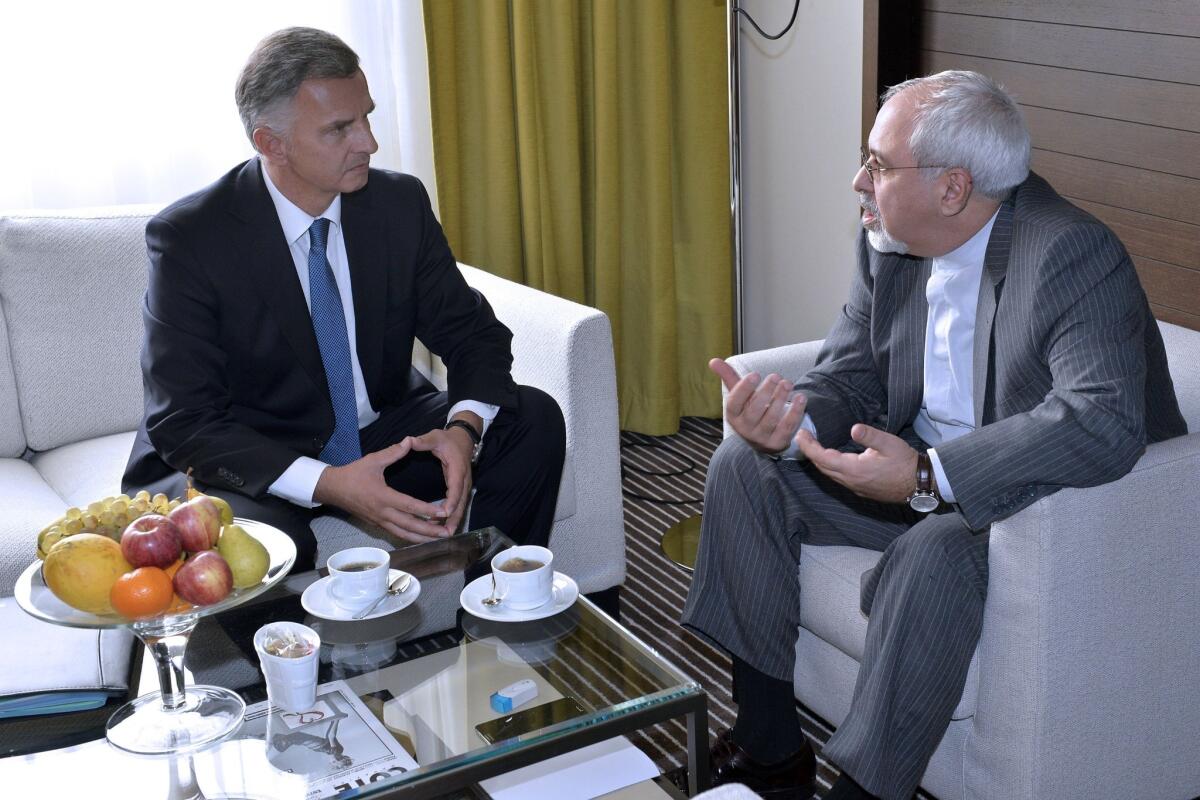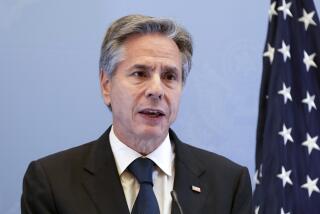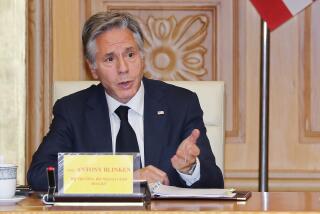Tehran hard-liners say Iran was asked to slow, not halt, enrichment

WASHINGTON — The six world powers negotiating with Iran over its disputed nuclear program asked Tehran in an opening proposal earlier this week to slow, rather than halt, low-level uranium enrichment at its two enrichment facilities, a hard-line website in Iran reported.
The Mashregh website said the six countries proposed in a meeting in Geneva on Tuesday and Wednesday that Iran also slow the installation of gas centrifuges, the machines that produce enriched uranium, at the Natanz and Fordo nuclear facilities.
The Obama administration declined to comment on the report.
The Farsi-language website said the six countries proposed that Iran convert its stockpile of medium-enriched nuclear material — which can be easily turned into nuclear bomb fuel — into low-enriched material, which is used in civil reactors and is seen as less threatening.
It said the diplomatic group asked that Iran limit its stockpile of low-enriched material to 10,000 kilograms, or about 22,000 pounds. The remainder of the stockpile should be turned into fuel rods, a form that can’t be used as bomb fuel, the group reportedly proposed.
It also asked that Iran sign an international protocol that would allow United Nations nuclear inspectors to more closely monitor the expanding nuclear program.
Iran and the six countries — the United States, France, Britain, Germany, Russia and China — agreed not to release details of each side’s proposals to reduce the chance that they could stir opposition that would undermine the new round of diplomacy.
After two days of meetings, both sides said the talks were going well and that there had been a detailed exchange of views. But since neither side provided details, it has been impossible to confirm that progress was made in narrowing the differences on what should be done about Iran’s nuclear program.
Many countries fear Iran is seeking a bomb-making capability, despite its denials.
There have been predictions that hard-liners in Iran and the West fearful of a deal would leak details in hopes of mobilizing opposition.
Ray Takeyh, an Iran specialist at the Council on Foreign Relations, said the proposal would be “rather generous,” because it doesn’t demand, as the group has in the past, that Iran ship its medium-enriched uranium out of the country. He noted that the account didn’t say how much relief from economic sanctions the group was offering in exchange for the concessions, adding that the account probably lacked other elements of the group’s proposal.
The United Nations Security Council has insisted, in a series of resolutions, that Iran halt all enrichment.
Mashregh is a relatively new media outlet, and it has sought to build opposition to the efforts of political reformists in Iran.
While it is difficult to assess the credibility of such reports, Iranian news organizations have been accurate in recent months in disclosing secret efforts by the Obama administration and Iran’s new president to start a new round of diplomacy.
Takeyh, a former administration advisor on Iran, said that it is more likely that disclosures would come from relative newcomers to the Iran media world, like Mashregh, rather than its mainstays.
He said that while the Iranian government influences all Iranian news media, because of advancing technology it isn’t able to halt all disclosures. “It’s not the U.S.S.R. of the 1950s,” he said.
The six powers have been expected to ask Iran for immediate steps to limit its nuclear program, so that it doesn’t keep advancing toward a bomb-making capability in the one-year period that negotiations are expected to take. Some independent analysts, such as David Albright of the Institute for Science and International Security, predict that Iran could have a nuclear weapons capability by the middle of next year.
In the run-up to the talks, Iranian officials declared that they would never give ground on three “red lines:” no closure of Fordo and Natanz, no halt of low-level enrichment, and no shipping of their stockpile of medium-enriched material abroad.
ALSO:
Norwegian friends, family describe Kenya mall attack suspect
Saudi Arabia rejects Security Council seat, lashes U.N. as failure
Mexico’s lower house of Congress approves new taxes on junk food Times staff writer Richter reported from Washington and special correspondent Mostaghim from Tehran.
hard liners say Iran was asked to slow, not halt, enrichment
More to Read
Start your day right
Sign up for Essential California for news, features and recommendations from the L.A. Times and beyond in your inbox six days a week.
You may occasionally receive promotional content from the Los Angeles Times.







